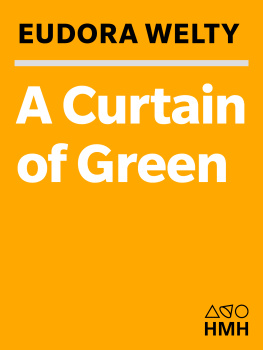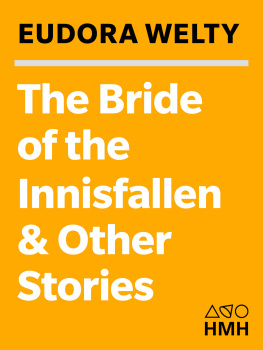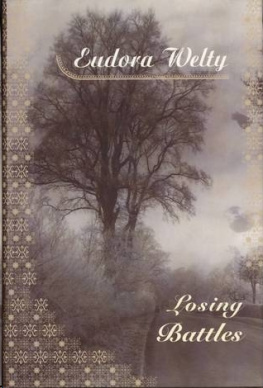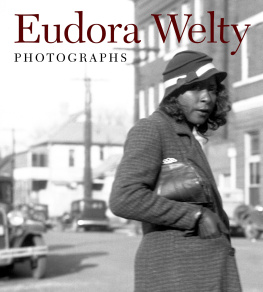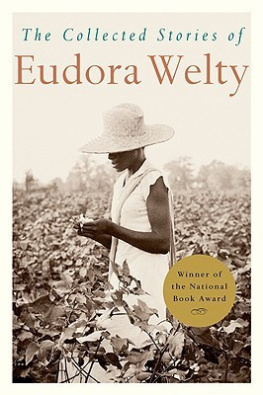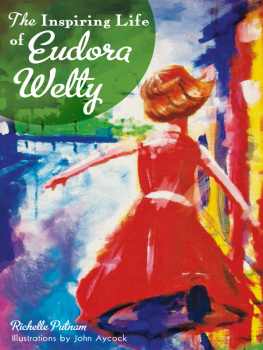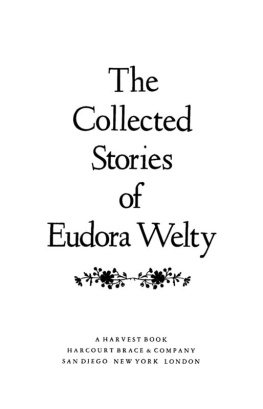Copyright 1941, 1939, 1938, 1937, 1936 by Eudora Welty
Copyright renewed 1968, 1967, 1966, 1965, 1964 by Eudora Welty
All rights reserved
For information about permission to reproduce selections from this book, write to or to Permissions, Houghton Mifflin Harcourt Publishing Company, 3 Park Avenue, 19th Floor, New York, New York 10016.
hmhco.com
The Library of Congress has cataloged the print edition as follows:
Welty. Eudora, 19092001
A curtain of green, and other stories.
(A Harvest book)
I. Title.
PZ3W4696Cu 1979
[PS3545 E6] 813'.52 79-10389
ISBN 978-0-15-623492-4
For permission to reprint some of the stories in this collection the author wishes to thank the editors of the Southern Review, Manuscript, the Prairie Schooner, Decision, New Directions, Harpers Bazaar and the Atlantic Monthly.
e ISBN 978-0-547-53850-1
v5.0218
TO
DIARMUID RUSSELL
Introduction
F RIENDS of us both first brought Eudora Welty to visit me three years ago in Louisiana. It was hot midsummer, they had driven over from Mississippi, her home state, and we spent a pleasant evening together talking in the cool old house with all the windows open. Miss Welty sat listening, as she must have done a great deal of listening on many such occasions. She was and is a quiet, tranquil-looking, modest girl, and unlike the young Englishman of the story, she has something to be modest about, as this collection of short stories proves.
She considers her personal history as hardly worth mentioning, a fact in itself surprising enough, since a vivid personal career of fabulous ups and downs, hardships and strokes of luck, travels in far countries, spiritual and intellectual exile, defensive flight, homesick return with a determined groping for native roots, and a confusion of contradictory jobs have long been the mere conventions of an American authors life. Miss Welty was born and brought up in Jackson, Mississippi, where her father, now dead, was president of a Southern insurance company. Family life was cheerful and thriving; she seems to have got on excellently with both her parents and her two brothers. Education, in the Southern manner with daughters, was continuous, indulgent, and precisely as serious as she chose to make it. She went from school in Mississippi to the University of Wisconsin, thence to Columbia, New York, and so home again where she lives with her mother, among her lifelong friends and acquaintances, quite simply and amiably. She tried a job or two because that seemed the next thing, and did some publicity and newspaper work; but as she had no real need of a job, she gave up the notion and settled down to writing.
She loves music, listens to a great deal of it, all kinds; grows flowers very successfully, and remarks that she is underfoot locally, meaning that she has a normal amount of social life. Normal social life in a medium-sized Southern town can become a pretty absorbing occupation, and the only comment her friends make when a new story appears is, Why, Eudora, when did you write that? Not how, or even why, just when. They see her about so much, what time has she for writing? Yet she spends an immense amount of time at it. I havent a literary life at all, she wrote once, not much of a confession, maybe. But I do feel that the people and things I love are of a true and human world, and there is no clutter about them.... I would not understand a literary life.
We can do no less than dismiss that topic as casually as she does. Being the child of her place and time, profiting perhaps without being aware of it by the cluttered experiences, foreign travels, and disorders of the generation immediately preceding her, she will never have to go away and live among the Eskimos, or Mexican Indians; she need not follow a war and smell death to feel herself alive: she knows about death already. She shall not need even to live in New York in order to feel that she is having the kind of experience, the sense of life proper to a serious author. She gets her right nourishment from the source natural to herher experience so far has been quite enough for her and of precisely the right kind. She began writing spontaneously when she was a child, being a born writer; she continued without any plan for a profession, without any particular encouragement, and, as it proved, not needing any. For a good number of years she believed she was going to be a painter, and painted quite earnestly while she wrote without much effort.
Nearly all the Southern writers I know were early, omnivorous, insatiable readers, and Miss Welty runs reassuringly true to this pattern. She had at arms reach the typical collection of books which existed as a matter of course in a certain kind of Southern family, so that she had read the ancient Greek and Roman poetry, history and fable, Shakespeare, Milton, Dante, the eighteenth-century English and the nineteenth-century French novelists, with a dash of Tolstoy and Dostoievsky, before she realized what she was reading. When she first discovered contemporary literature, she was just the right age to find first W. B. Yeats and Virginia Woolf in the air around her; but always, from the beginning until now, she loved folk tales, fairy tales, old legends, and she likes to listen to the songs and stories of people who live in old communities whose culture is recollected and bequeathed orally.
She has never studied the writing craft in any college. She has never belonged to a literary group, and until after her first collection was ready to be published she had never discussed with any colleague or older artist any problem of her craft. Nothing else that I know about her could be more satisfactory to me than this; it seems to me immensely right, the very way a young artist should grow, with pride and independence and the courage really to face out the individual struggle; to make and correct mistakes and take the consequences of them, to stand firmly on his own feet in the end. I believe in the rightness of Miss Weltys instinctive knowledge that writing cannot be taught, but only learned, and learned by the individual in his own way, at his own pace and in his own time, for the process of mastering the medium is part of a cellular growth in a most complex organism; it is a way of life and a mode of being which cannot be divided from the kind of human creature you were the day you were born, and only in obeying the law of this singular being can the artist know his true directions and the right ends for him.
Miss Welty escaped, by miracle, the whole corrupting and destructive influence of the contemporary, organized tampering with young and promising talents by professional teachers who are rather monotonously divided into two major sorts: those theorists who are incapable of producing one passable specimen of the art they profess to teach; or good, sometimes first-rate, artists who are humanly unable to resist forming disciples and imitators among their students. It is all well enough to say that, of this second class, the able talent will throw off the masters influence and strike out for himself. Such influence has merely added new obstacles to an already difficult road. Miss Welty escaped also a militant social consciousness, in the current radical-intellectual sense, she never professed Communism, and she has not expressed, except implicitly, any attitude at all on the state of politics or the condition of society. But there is an ancient system of ethics, an unanswerable, indispensable moral law, on which she is grounded firmly, and this, it would seem to me, is ample domain enough; these laws have never been the peculiar property of any party or creed or nation, they relate to that true and human world of which the artist is a living part; and when he dissociates himself from it in favor of a set of political, which is to say, inhuman, rules, he cuts himself away from his proper societyliving men.
Next page
